1、西蒙·西涅莱,伊夫·蒙当 主演的电影《萨勒姆女巫事件》来自哪个地区?
爱奇艺网友:电影《萨勒姆女巫事件》来自于其它地区。
2、《萨勒姆女巫事件》是什么时候上映/什么时候开播的?
本片于1957年在其它上映,《萨勒姆女巫事件》上映后赢得众多观众的喜爱,网友总评分高达1461分,《萨勒姆女巫事件》具体上映细节以及票房可以去百度百科查一查。
3、电影《萨勒姆女巫事件》值得观看吗?
《萨勒姆女巫事件》总评分1461。月点击量4次,是值得一看的剧情片。
4、《萨勒姆女巫事件》都有哪些演员,什么时候上映的?
答:《萨勒姆女巫事件》是1957-04-26上映的剧情片,由影星西蒙·西涅莱,伊夫·蒙当主演。由导演雷蒙·鲁洛携幕后团队制作。
5、《萨勒姆女巫事件》讲述的是什么故事?
答:剧情片电影《萨勒姆女巫事件》是著名演员西蒙· 代表作,《萨勒姆女巫事件》免费完整版1957年在其它隆重上映,希望你能喜欢萨勒姆女巫事件电影,萨勒姆女巫事件剧情:The Crucible的最早版本,比Daniel Day Lewis的版本早了四十年
萨特巨巨改编的剧本,马克思主义个人特征很明显了。跟原剧本确实不是同一个故事啊,原本三人成虎的小镇猎巫影射麦卡锡主义的充满宗教元素的故事,被萨特写成了反抗压迫的阶级斗争,宗教元素被弱化到只是导火索。前因补充了太多,还是先入为主的喜欢直接从后果讲起的版本。
Hale牧师角色被弱化太冤了,原剧本里他态度的转变和最后的绝望其实是特别重要的一条线。 然后John进监狱后的情节被改编的我看不下去!结尾也是!Abigail的演员演技可怕(not compliment),眼神和表情我觉得适合演鬼故事…结果居然备受好评?行吧是我品味不够…
看NT Live版时也许是口音的关系,脑中还是英国背景,所以这版展现的殖民地时期原始建筑风格还是有点冲击的。相比这版老旧的配乐,还是NT Live的配乐足够惊艳,只要回想起来立马眼前就是政教合一背景下人人自危的画面感。
亚瑟米勒-梦露-伊夫蒙当的三角恋也是幕后一大瓜了……
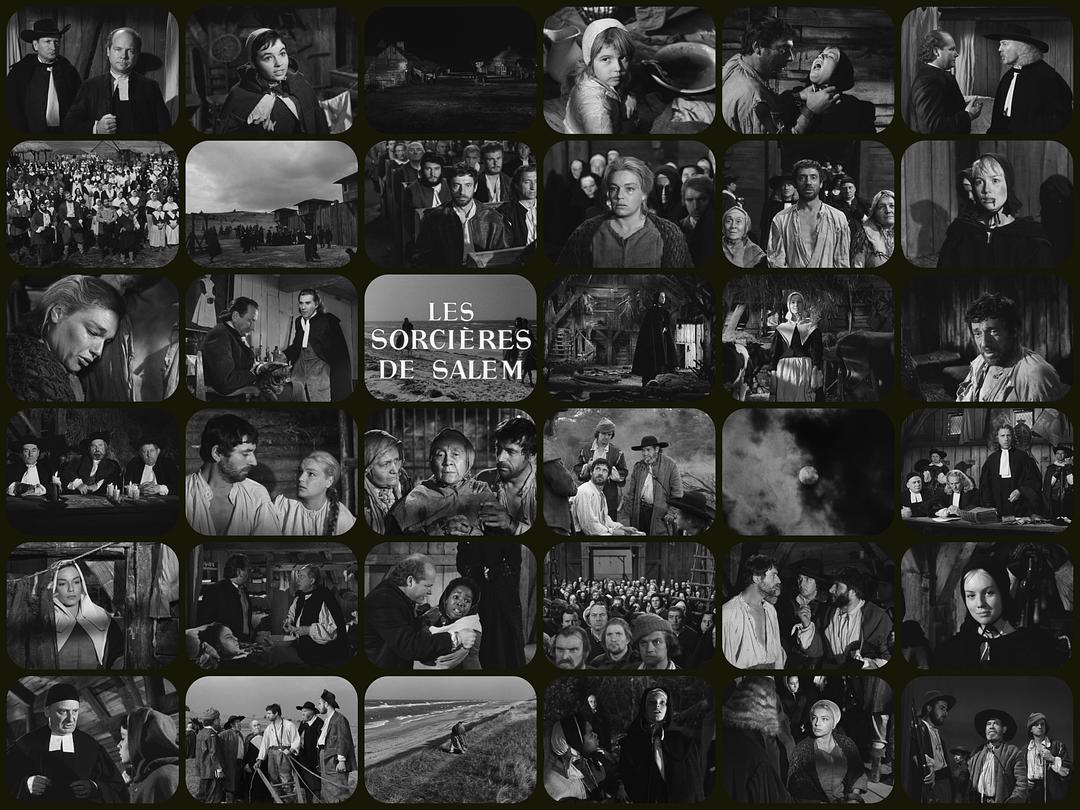
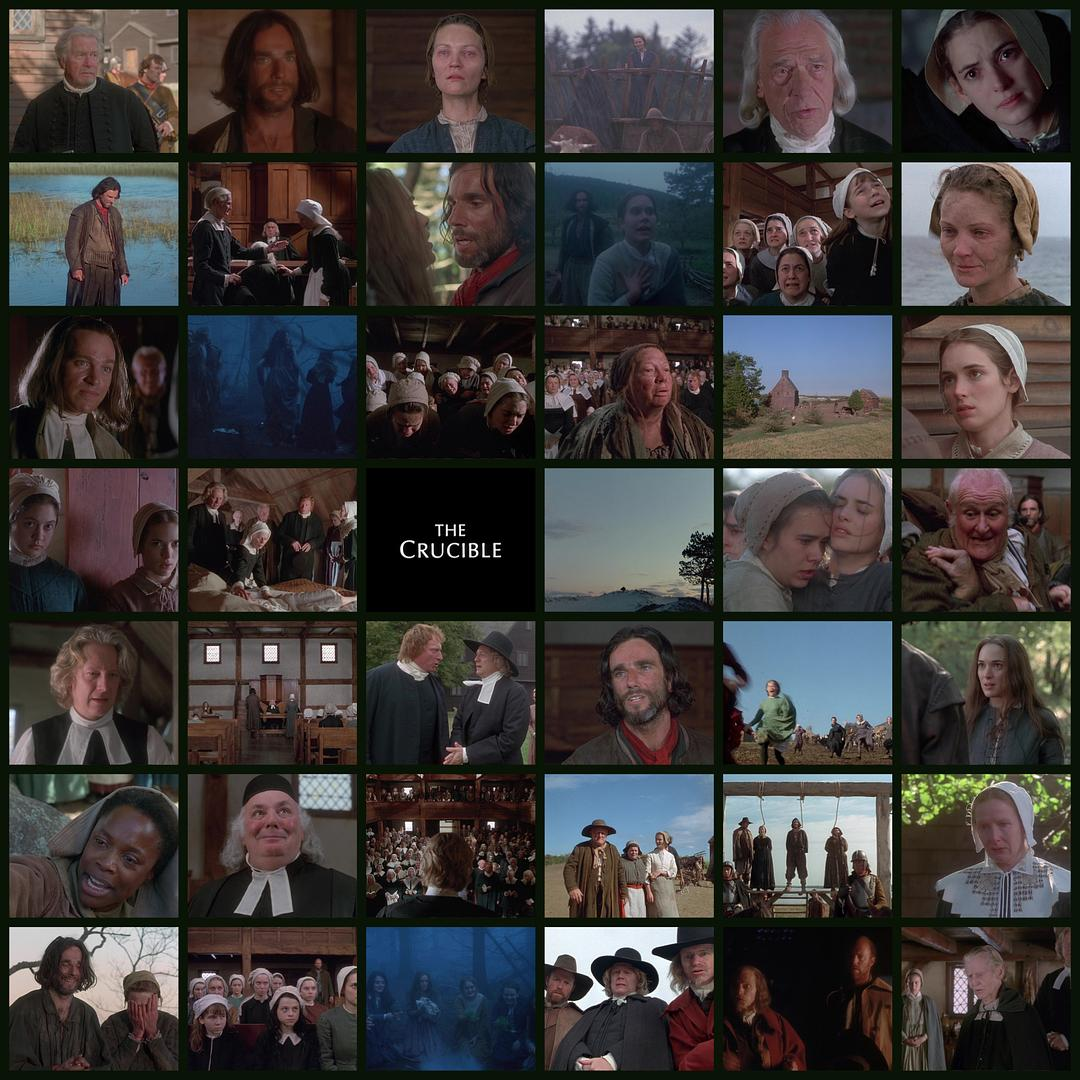
Two film adaptations of Arthur Miller's seminal 1953 stage play THE CRUCIBLE, a partially fictionalized account of the notorious Salem witch trials in the Massachusetts Bay Colony during 1692-93, which, in Miller’s intention, is also a thinly veiled rebuttal to McCarthyism, which he would be enmeshed in several years later, and causes him being blacklisted in Hollywood after refusing to name names.
Such finger-pointing and principle-upholding is not so dissimilar from the story of THE CRUCIBLE, where an outburst of mass hysteria in the New World results in pernicious persecutions leveled at innocent folks, after the authority figures (judges, clergymen, the affluent), spurred by either God’s complex, political motives or money-grubbing, land-grabbing avarice, take as read the fanciful accusations from a cohort of teenage girls, who shams demonic possessions for fear of being punished for their innocuous love spell invocation. Among those girls, a vengeful Abigail Williams, who is the spurned lover of local farmer John Proctor, capitalizes on the opportunity to accuse John’s virtuous wife Elizabeth as a witch. It is a grave crime under pain of death, the accused must make a confession to save their own skins.
To debunk the falsehood of the girls’ vicious accusations, John appeals to the deputy governor-cum-judge Danforth, making a clean breast of his adultery with Abigail. Only his testimony is negated after an unwitting Elizabeth fails to corroborate it as she is consumed by her own share of guilt about the affair (her frigidity is to blame) and cannot bear to smear John’s repute. Consequently, out of irrepressible ire and despair, John utters the blasphemous “God is dead!” and is also arrested to be a witch. Facing the noose (Elizabeth is temporarily saved by a fortuitous pregnancy), John is tempted to make a confession, but at what cost? He must sell both his soul and good name to escape the noose, all because of what?
Both Rouleau's black-and-white French version and Hytner’s colored US version stick to the plot with much fidelity. The former, scripted by Sartre with a piercingly astringent tang, has more details about the central love triangle. How the adultery turns sour and how the couple reconciles themselves with its aftermath. Abigial’s infatuation with John is so undimmed that it almost arouses audience’s sympathy towards her in the end, where she is spared and will be plagued by the grievous injustice and loss as long as she breathes. Meantime, the latter opens directly with the girls’ dusky, sylvan caper and composes a more compact, Manichaean narrative with no grey area to complicate the complexity of humanity (Abigail is heedlessly consigned as an absconder after being rebuffed by John, and that’s all she wrote. Bruce Davison’s Reverend Parris is an out-and-out anathema with no redeeming features). Hytner’s popularized, preachy approach is the go-to technique from Hollywood mainstream filmmaking, it is simpler to digest but Rouleau’s film has more integrity and gnawing conflicts to knock audience dead.
Pairing the French matinee stars and real-life couple Signoret and Montand as Elizabeth and John, Rouleau’s film allows them to expound on the plight of a husband’s unquenched libido and a wife’s inability to perform her marital duty with fervent candidness. Signoret’s Elizabeth is a rock of stillness and virtue, under her glacial surface, she is tormented by the only lie she ever utters, that pushes her husband closer to the noose. Her gaze in the climax is both haunting and haunted, yet, she is still lucid enough to know who should be held accountable. Montand is even better. John’s love/hate oscillation towards Abigail is the original sin that every man shall contend against, which Montand vivifies up to eleven in all its bareness and boldness, let alone the emotional swerves that propels the film to its heroic finale. The film also contributes the star turn for Demongeot, whose Abigail is a dainty, sultry amalgamation of evil and desire implanted upon a death-defying one-track mind: she wants what her heart desires, by hook or by crook. Lastly, Pascale Petit is an astonishing debutante as Mary Warren, the young maid whose fraught mutability serves up the living proof of the untrustworthy nature of a child’s play, and by extension, of the vileness of a twisted, bigoted, biased adult mind.
In Hytner’s film, Ryder’s Abigail and Day-Lewis’s John are the leads, they are merely fine (Ryder is deficient in intensity which Day-Lewis has too much to spare, but here, John’s martyrdom feels less poignant). Joan Allen rightly earns an Oscar nomination for playing Elizabeth, quite a beanpole of fortitude and a pillar of strength, whose voltage can even dim Day-Lewis’s during their exquisite heart-to-heart. Paul Scofield, taking his silver-screen curtain call as Judge Danforth (a role played with repellent monotony by Rouleau himself in the 1957 film), intriguingly transcends the role’s formal rigidity and abominable designation, entertains and sometimes bemuses audience with his mellow cadence and all those condescending, suspicious looks and glances. A perfect embodiment of disdain and self-regard, he is another villain one cannot get enough. Also, it is remiss not to mention Charlayne Woodard’s jaw-dropping cameo as Tituba, the Barbados slave who becomes the scapegoat of the girls’s mischief and sets the screen ablaze as a blatant manifestation of the unholy, racist victimization.
Peered through a presentism lens, Miller’s play cannot dispel the impression that it glorifies a man’s virility and dignity, often at the expense of a woman’s integrity (Elizabeth’s self-claimed culpability in John’s affair cannot sit comfortably with today’s ethos). A whiff of misogyny also billows out when young girls, those seemingly innocent, pure-hearted creatures, can simply go berserk and act weird en masse, deliberately do harm to others in league. Therefore, made nearly 40 years after, Hytner’s enterprise misses its chance to upcycle the material (one crucial reason may be that Miller himself is the sole screenwriter), and Rouleau’s version remains as a minor classic for all its luster flickering through the sins committed by our basest minds.
referential entries: Carl Theodor Dreyer’s DAY OF WRATH (1943, 7.5/10); George Cukor's LET'S MAKE LOVE (1960, 6.2/10); Antonio Pietrangeli's HUNGER FOR LOVE (1960, 7.0/10); Martin Scorcese's THE AGE OF INNOCENCE (1993, 7.9/10).
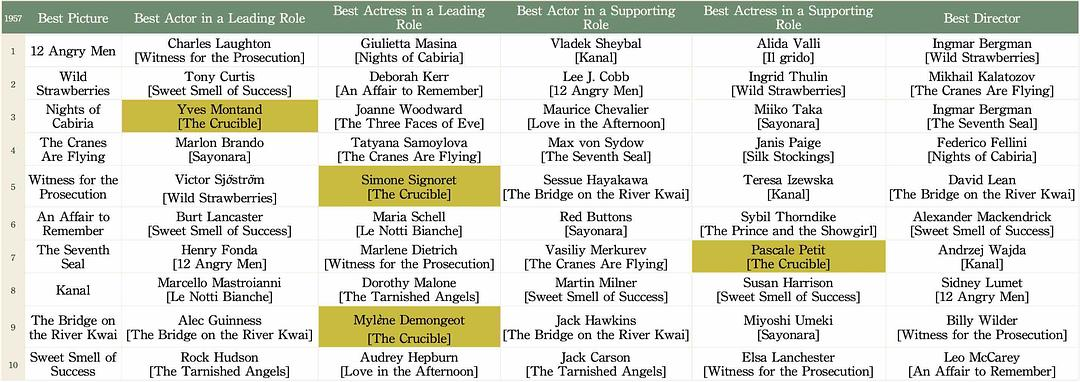
English Title: The Crucible
Original Title: Les sorcières de Salem
Year: 1957
Country: France
Language: French
Genre: Drama, History
Director: Raymond Rouleau
Screenwriter: Jean-Paul Sartre
based on the play by Arthur Miller
Music: Hanns Eisler
Cinematography: Claude Renoir
Editor: Marguerite Renoir
Cast:
Yves Montand
Simone Signoret
Mylène Demongeot
Jean Debucourt
Raymond Rouleau
Alfred Adam
Pascale Petit
Pierre Larquey
Françoise Lugagne
Jean Gaven
Jeanne Fusier-Gir
Michel Piccoli
Alexandre Rignault
Darling Legitimus
Chantal Gozzi
Gerd Michael Henneberg
Yves Brainville
Rating: 7.4/10
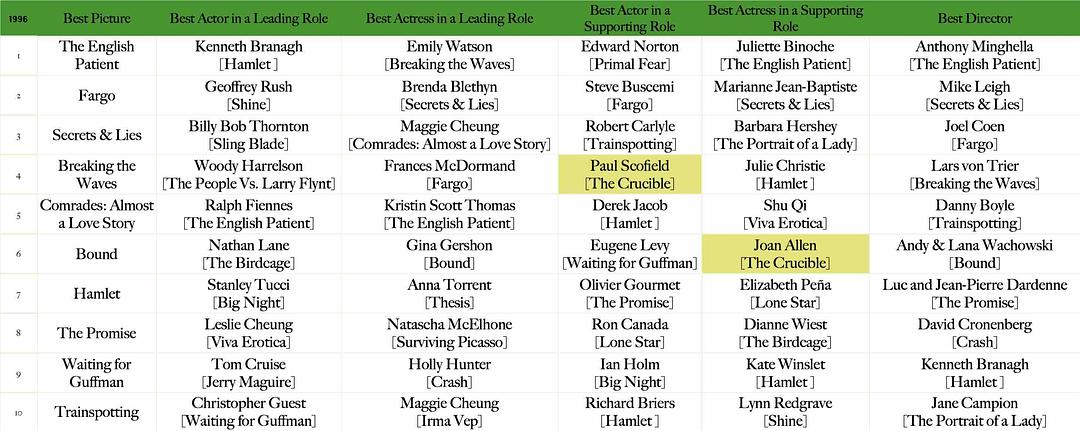
Title: The Crucible
Year: 1996
Country: USA
Language: English
Genre: Drama, History
Director: Nicholas Hytner
Screenwriter: Arthur Miller
Music: George Fenton
Cinematography: Andrew Dunn
Editor: Tariq Anwar
Cast:
Daniel Day-Lewis
Winona Ryder
Paul Scofield
Joan Allen
Bruce Davison
Rob Campbell
Jeffrey Jones
Peter Vaughan
Karron Graves
Charlayne Woodard
Frances Conroy
Elizabeth Lawrence
George Gaynes
Mary Pat Gleason
Tom McDermott
Robert Breuler
Rating: 6.9/10
第14届#法罗岛电影节#主竞赛单元第8个放映日为大家带来《萨勒姆女巫事件》,下面为大家带来前线被指为女巫的人们沉痛不堪的评价了!
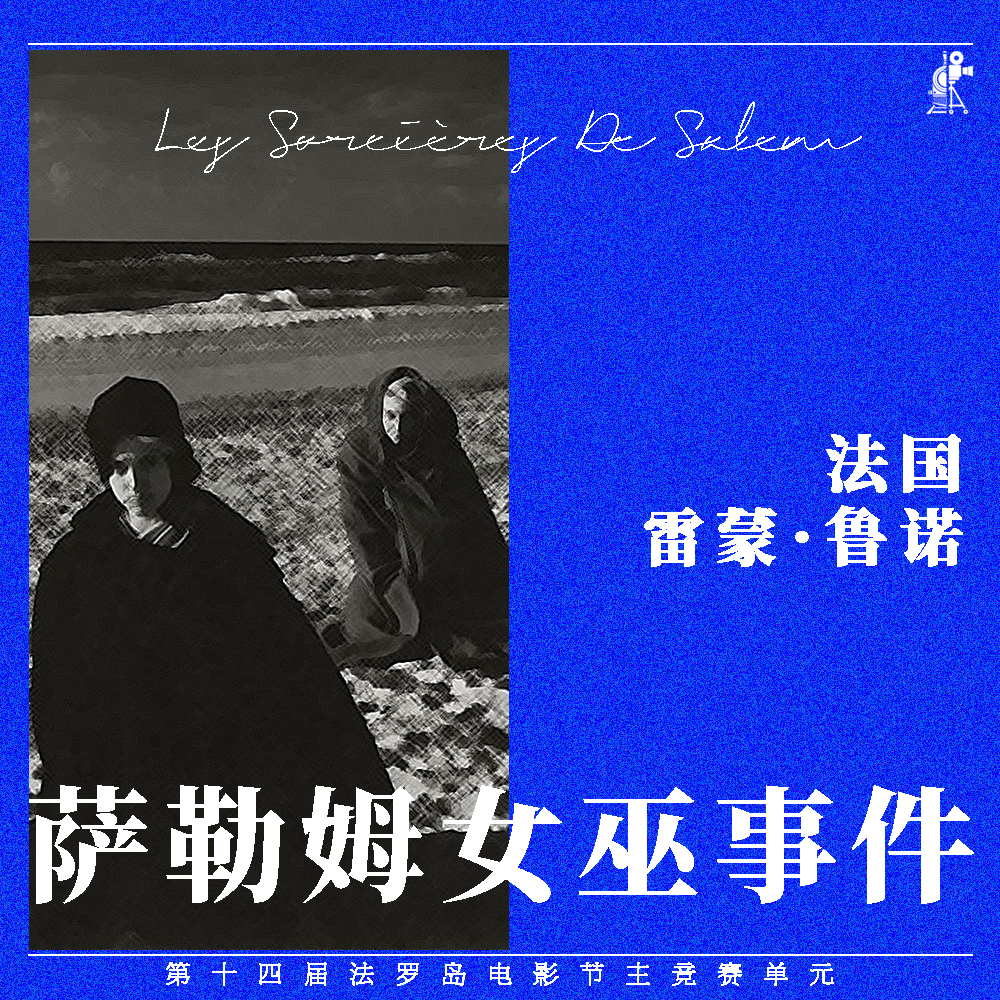
Prometheus:
让我想起了《叫魂》 。
米米:
当“魔鬼”披上“上帝”外衣。。。
欧.尹:
社会最可怕的形态,以上帝之名行魔鬼之事。
我们敏熙:
红玫瑰,白玫瑰,都是让一个罪人死得像个殉道者。
SONGMJ23:
张驰无度,手法陈旧。人性之恶虽已蔓延,但批判未达到应有的高度。
松野空松:
跳出典型的宗教压迫电影,将问题指向权力的反噬,Raise a glass to freedom……
果树:
各方面都选择了非常沉痛有力的表达,来映合全片对于压抑、压制、压迫的表述。
盆满钵满赵+:
女巫只存在于人们的脑海里。冠以宗教之名的谋害很可怕,更可怕的是作品里人们对于罪的定义。
Her Majesty:
阿瑟•米勒的原戏剧探讨了三人成虎和集体暴力的问题,而萨特这个法左着手这个电影剧本之后,立即给其披上了阶级性的政治元素,使得电影获得了宗教、文学、政治、人性等多音响得效果,成色更加丰富。
给艾德林的诗:
节奏拖,看起来像刻意模仿德莱叶,萨特大佬改的本子蛮简单一根筋,法官承担功能性角色又过被动,对比其他三角恋情感层面过主动当然有些失位,加上群像话剧式不分主次,整体也就平平无奇,不过全程大景深体现环境压迫还是不错的,加一星。
子夜无人:
一个很奇妙的地方是,这对夫妻之间原来是神化的无性状态,反而在那个因为“共犯感”降临并且空前高涨的夜晚里,他们之间激情重燃,整部电影里所有的魑魅魍魉都源于这样的欲求不满。从没看过这种法庭戏,世俗条律审判鬼神巫蛊本来就是矛盾割裂感极其严重的一幕,但在人类本身可以释放的疯狂能量当中又被弱化。为了掩人耳目可以发生的一切捕风捉影、攀咬诛连相继上演,对人物最后悲壮性的渲染如果有所收敛,我几乎就看不出这是话剧电影了。
#FIFF14#DAY8的主竞赛场刊评分将在稍后为大家释出,请大家拭目以待了。